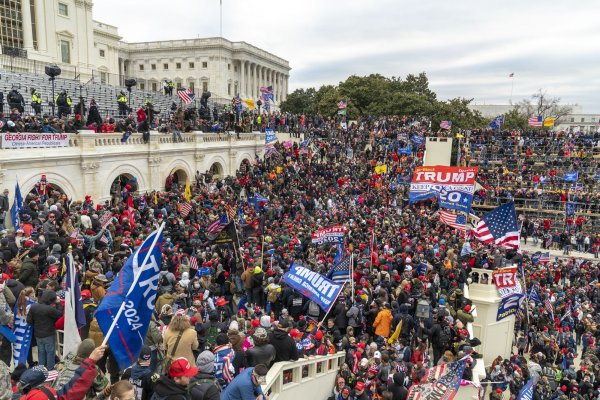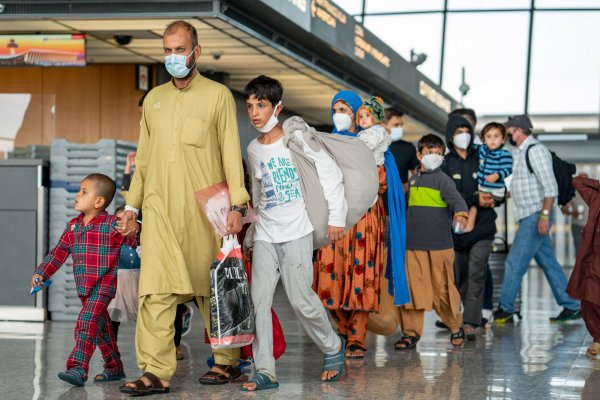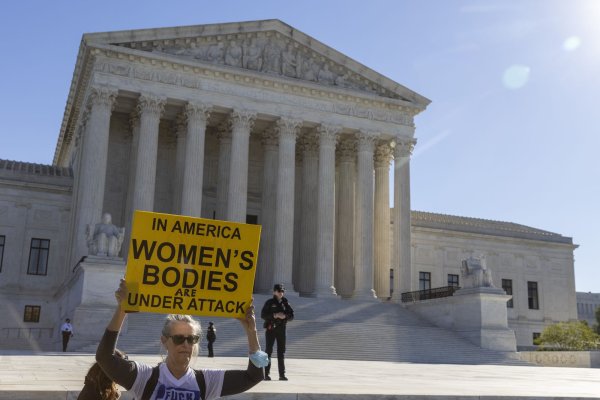Dec. 27 (UPI) — The year 2021 was arguably one of the biggest news years in recent memory, with a number of major stories emerging over the 12 months on the calendar — COVID-19, the attack at the U.S. Capitol, a presidential transition, social unrest, the end of more than two decades of war in the Middle East, and much more.
The novel coronavirus, first reported in China in late 2019, continued to make its presence known this year, despite hopes that multiple vaccines would bring a return to normalcy.
Unfortunately, as a new variant of concern, Omicron, has ramped up its spread in recent weeks, the United States is bracing for yet another spike in cases to close out the year and open 2022.
Also in 2021, the world staged the Summer Olympics after a historic hiatus, major weather disasters bookended the year and changes to Texas’ abortion law could upend a nearly 50-year-old landmark Supreme Court ruling.
COVID-19 — year two

The year began in the middle of the worst spike to date of COVID-19 cases in the United States. The country recorded its single-highest number of daily cases on Jan. 8, with more than 294,000 cases, according to the Centers for Disease Control and Prevention.
That was less than one month after the country began administering the first doses of COVID-19 vaccine — initially limited to healthcare professionals, the elderly and those with compromised immune systems.
Millions of Americans received jabs during those first handful of months of 2021, coinciding with a precipitous drop in daily cases and deaths that lasted into the summer. Cases bottomed out in late June to figures not seen since March 2020, giving many the impression the country — and indeed the world — had finally made it to the other side of the pandemic.
Life was beginning to return to normal, with travel picking back up in some regions of the world and restrictions being lifted. In-person events such as concerts, theater and movie screenings returned, and stadiums and arenas were once again full for sporting events. Children returned to school without masks in many states.
Then public health officials designated Delta as a COVID-19 variant of concern. The more infectious strain of the virus quickly spread and became the dominant version of COVID-19 in the United States, causing case numbers to rise again through the fall.
After a dip in cases in September and October, figures began rising again in November with the emergence of the highly infectious Omicron variant. The fall also saw the expansion of vaccine approval for younger children and booster shots for those who’d previously been fully vaccinated.
President Joe Biden announced that beginning in the new year, the United States plans to further fight the pandemic with the release of 500 million free at-home testing kits and military help at over-burdened hospitals.
U.S. Capitol attacked for first time since 1814

The new year ushered in a new president and the (early) departure of another. Former President Donald Trump repeatedly declared the 2020 presidential election to be stolen, despite no evidence whatever of widespread fraud or security failures, and his most ardent supporters showed solidarity by attending various rallies.
On Jan. 6, Trump staged a rally on the Ellipse near the White House at which he reiterated the same baseless claims about election fraud. He also called on his supporters to march to the U.S. Capitol and demand that Congress reject the Electoral College votes that would remove him from office and replace him with Biden.
“If you don’t fight like hell, you’re not going to have a country anymore,” he said, infamously, during the speech.
“So we’re going to … walk down Pennsylvania Avenue. … And we’re going to the Capitol, and we’re going to try and give … [Republicans] the kind of pride and boldness that they need to take back our country.”
Moments later, thousands of Trump supporters trekked to the Capitol, breached security lines put in place by Capitol Police and entered the building. What resulted were several hours of violence and vandalism and five deaths. At least 138 law enforcement officials were injured in the melee, which was broadcast live on television and over the Internet the world over.
It was the most severe assault on the Capitol since British troops burned the building during the War of 1812.
In the weeks to follow, Trump became the first U.S. president to be impeached twice — though the Senate was unable to secure enough votes to convict him of inciting the violence.
While he evaded punishment from Congress, which could have barred him from ever holding office again, Trump wasn’t so lucky on his social media channels — Facebook, Twitter and YouTube each banned him from their platforms for posing a public safety risk over the Capitol attack.
The FBI has charged more than 700 participants with crimes related to the riots, mostly to entering the restricted Capitol grounds and disorderly conduct, and in some cases violence and theft charges.
The House Select Committee on the January 6 Attack was formed in July to investigate the riots and determine its causes and whether there was adequate response by law enforcement. The panel will continue its work into 2022.
Unusual cold, hurricanes and tornadoes

The United States experienced its fair share of natural disasters in 2021, as well, starting with an unusual cold snap in Texas early in the year.
The winter storm, which began Feb. 13, brought several inches of snow and left the southern state in below-freezing temperatures for several days and created widespread power outages.
Rarely used heating systems overworked the state’s power grid, causing rolling and total blackouts for millions of people over the course of two weeks.
Unable to cope with the snow and temperatures, traffic snarled and air travel came to a halt throughout the region.
State officials blamed the storm and power outages for more than 200 deaths across the state, but a BuzzFeed analysis of excess deaths found between 426 and 978 more people than expected died in Texas during the week ending Feb. 20.
The storm caused nearly $200 billion in damage, making it the costliest winter storm on record.
Seven months later, Hurricane Ida landed a double blow on the United States. It made landfall Aug. 29 in Louisiana as a Category 3 storm, bringing significant damage to New Orleans and causing more than three dozen deaths in the South.
Ida meandered through the South and into the Northeast, and later brought flooding to New York and New Jersey, killing at least 48 people, some who were trapped in their basement apartments.
In December, an outbreak of severe storms and tornadoes tore through the Midwest and South, killing close to 100 people. The devastation was centered largely in Kentucky, where one twister destroyed a candle manufacturing facility where people were working.
It was the deadliest string of tornadoes in the United States since close to 200 people were killed in an outbreak in 2011.
The 2020 Summer Games begin — a year late

The 2020 Summer Olympics opened in Tokyo in July, one year late after an unprecedented delay due to COVID-19.
Despite a seeming return to normalcy with the major sporting event, Japanese officials implemented restrictions to limit the spread of the virus, beginning with a strict testing and quarantining regime.
At first, organizers decided to allow only local residents to attend the Games — a decision they later rescinded amid a surge in coronavirus cases and states of emergency across Japan. In the end, only those associated with the Games — athletes, coaches, trainers and the press — were allowed in the stands.
The United States took home the most overall medals from the Games (113), followed by China (88), the Russian Olympic Committee athletes (71), Britain (65) and Japan (58). Team USA also won the most gold medals — 39 — after making a late surge in victories to overtake China in the final days.
The delay also set up the shortest time period between the Summer and Winter Olympic Games in history — six months, as the 2022 Winter Games are scheduled to begin in Beijing on Feb. 4. Chinese organizers have also barred spectators from the Games due to the ongoing pandemic, particularly with the rise of the Omicron variant.
As of this writing, the Beijing Games are still set to open as scheduled. However, the Winter Olympics will be historic in their own right — as they’ll be the first in 42 years to be marred by some type of international boycott.
The United States and multiple other nations have ordered a diplomatic boycott of the Games over purported human rights abuses of Uyghur Muslims in Xinjiang province. No official delegation from the boycotting countries will travel to Beijing, but their athletes will still compete.
Leaving Afghanistan after 20 years

After taking office in January, President Biden committed to withdrawing U.S. forces in Afghanistan and ending the American-led military campaign that began after the Sept. 11 terrorist attacks in 2001, and set a withdrawal deadline of Aug. 31.
In August, the withdrawal met with large-scale efforts to evacuate more than 122,000 people from Afghanistan. It was the largest airlift in U.S. history.
Former President Donald Trump made an agreement with the Taliban in early 2020 and promised to withdraw all U.S. forces by May 1, 2021. After Biden became president, he put the deadline off by four months.
The United States began the process of evacuating troops and diplomatic staff when the Taliban attacked the Afghan government in Kabul, eventually seizing control of the capital on Aug. 15. The United States and allies then ramped up efforts, also working to evacuate interpreters and other Afghans who aided American forces during the war or were in danger from the Taliban.
The airlift resulted in some 200 deaths, including Afghans who were desperate to leave — some of whom were crushed at the Kabul airport, and some who fell to their deaths after jumping onto the departing planes.
The majority of deaths came during a suicide bombing at the airport on Aug. 26. The blast killed about 170 Afghan civilians awaiting transport out of the country and 13 U.S. service members. Dozens were injured in the attack, for which the Islamic State-Khorasan Province claimed responsibility.
Biden promised retaliation for the attack and the Pentagon launched an airstrike on a vehicle it thought was being driven by an ISIS-K militant. An investigation later determined the vehicle wasn’t associated with the group and the strike killed 10 Afghan civilians, including several children.
The Biden administration faced blowback for its handling of the evacuation, with the president’s approval ratings dipping to new lows in August, according to Gallup.
Abortion under fire

Another major issue in 2021 was abortion — particularly a restrictive law in Texas that has the potential to upend the landmark 1973 Supreme Court ruling Roe vs. Wade.
The divisive law bans all abortions after a fetal heartbeat can be detected, which normally occurs around the six-week mark of a woman’s pregnancy — a time when many women are unaware they’re even pregnant.
It’s the most restrictive law to go into effect since the Roe vs. Wade ruling, which protects a woman’s right to an abortion without excessive government interference.
What has made the Texas law so difficult to challenge is that, to enforce the law, the state allows the general public to sue anyone who performs or assists a woman obtain an abortion. There have been numerous attempts to block the law and arguments have made it to the Supreme Court.
The high court has said that a federal appeals court should handle the case, but it’s possible that the legal challenges will end up before the high court and force the conservative-leaning court to make a ruling that could be at odds with Roe vs. Wade.
In September, the Supreme Court controversially declined to intercede with the legal battle and again allowed it to stand early in December.






